#Kids Good St
Text
*squish*
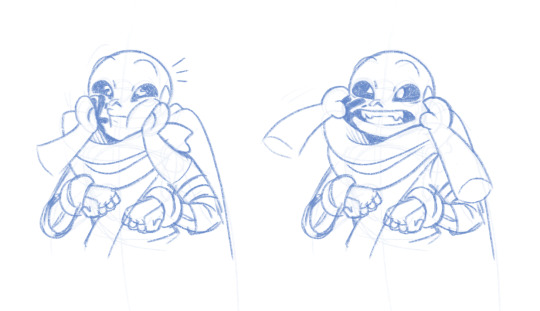
Ink server said that Splattertale Ink’s cheeks looked squishy.
I felt the urge to draw.
Ink belongs to @comyet
#it can be taken as normal Ink as well cuz…#well there’s no real visual difference between the two#one just has a kid#undertale au#utmv#ink sans#sketchingstars art#st ink#splattertale#It was also good squash and stretch practice#drew this in a different program than clip studio#can you tell?
779 notes
·
View notes
Text


#care bears#good luck bear#irish#st patricks day#st paddys day#kidcore#nostalgia#nostalgic#retro#1980s#eighties#80s#80s kid#pastel#four leaf clover#good luck#teddy bears#childhood#cute#balloons#colourful#colorful#stars#rainbows#illustration#hallmark
1K notes
·
View notes
Text

i have a soft spot for fics where billy sort of ends up adopting el and will alongside max. like, these are the kids that get dibs for rides in the camaro haha.
also im unfortunately not participating bc prev commitments but #harringrove for turkey is happening right now if yall want to donate to the earthquake relief funds for turkey & syria and get some art/fic back from harringrove fans! :) check out the tag if you're interested!!
#stranger things#stranger things fanart#billy hargrove#max mayfield#will byers#jane hopper#st eleven#eleven#eleven stranger things#obviously the ones where the party as a whole adopts billy are also very good#but i think it's cute when they end up getting split like this#it's precious when will asks billy for gay advice and maybe has a tiny crush on him#where billy and el bond over bad papas and containing anger and billy learning to find childish innocence again through her eyes#where max finds out about neil and stubbornly decides to get through to billy and when billy starts reaching back that's it.#theyre ride-or-die now.#i like those kinds of fics :') and steve gets the other half and then they co-parent together#billy's all right w the other kids too but whenever i interpret his relationships with lucas & mike#it always comes off more to me as 'these are the significant others of my kids so they are automatically on thin ice'#and with dustin it's always 'this is my boyfriend's little brother'#but will and el and max are billy's directly#i digress!#sometimes i dont post at all and then i post two things in a week! consistency who???
616 notes
·
View notes
Text
Headcanon that Seven of Nine and Naomi actually find Neelix’s cooking to be fine because it’s the only food they’ve ever eaten/their first introduction to food and when they get to Earth everyone’s so excited to show them Alpha quadrant foods but neither of them likes anything they’re offered very much. Seven doesn’t really care either way except that she has to get used to a whole new palette and Naomi likes the obvious (Ex: candy, cake) but frequently complains that nothing tastes ‘right’.
Naomi: -pushing away a slice of pizza- I don’t like it...
Tom: You’re kidding me. You don’t like pizza?
Naomi: It doesn’t taste right! Make it how Neelix used to.
Tom: You want me to put gerhalorian beets and yuk mushrooms in the sauce so it congeals into a lumpy, slightly sour mess? Is that what you want, Naomi?
Naomi: Yeah :(
I want Naomi and Icheb to work tirelessly together on a side project for years until finally doing it - being able to communicate clearly with those in the Delta quadrant! Icheb uses it to speak to the other borg children (now adults) and Naomi immediately uses it to call Neelix and ask him to find the nearest time portal and toss a big box of leola root into it. She’s been craving it for years! No one told her the Alpha quadrant didn’t have leola root, she wouldn’t have gone otherwise!
#Naomi's suffering through the worst case of 'food you had ALL the time as a kid but can't get as an adult'#Her next goal is constructing some way for ships to pass through the quadrants quickly and safely so Neelix can come visit her and also#Voyager's crew can stop getting themselves hopelessly lost and presumed dead out there#Naomi's favorite joke is that if she knew the alpha quadrant had/didn't have X she wouldn't have come! Her mom doesn't love it v_v#st voyager#Naomi Wildman#Seven of Nine#Neelix#I also think every member of the crew has a certain food they really loved but can never eat again v_v either bc alpha quad doesn't have the#ingredients or the replication abilities or bc it was something that was given as a gift by a delta quad alien or Neelix was only able to#make it once etc#I believe Neelix's cooking is a mixed bag. Some of his dishes are earnestly not good and some of them are for a palette that#the crew doesn't have...but after seven years you develop a palette. Like they still PREFER alpha quadrant food but every so often they're#like DAMN...do you remember when Neelix made-? and it's always a happy conversation#OH and also he has limited ingredients bc of Voyager's situation and doesn't know what the human foods they ask for are or what they should#taste like so it's trial and error babey!!!
385 notes
·
View notes
Text
Summary of Chapter 16: From the shadows appears a tall man in a mask, his hazel eyes drift down to Bruce as if checking him over before the man takes a step towards the child. Of course that doesn't bode well with the parents who take a step forward at the threat, Martha grabbing her only child by his shoulders and making him step back while Thomas stands in front of his wife and son. "We don't want any trouble, sir. Do you nee-"
#dc comics#dc universe#dcu#bruce loves his kids#bruce wayne is a good dad#bruce wayne#alfred pennyworth#dick grayson#jason todd#tim drake#damian wayne#hurt/comfort#tw abuse#child abuse#physical abuse#tw noncon#tw inc*st
57 notes
·
View notes
Text




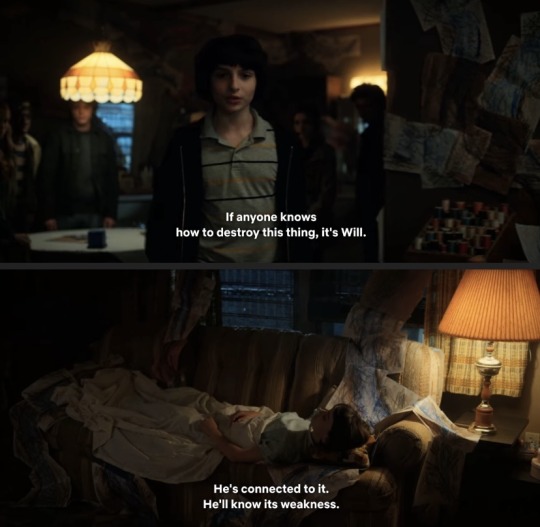



#byler#stranger things#will byers#parallels#possessed will = void stiles#like the inspo is clear as day#also them casting mason dye in st as jason the captain of the basketball team#and a leading force in essentially down our main kids...#mason who was also cast in tw as garrett captain of the lacrosse team#who was a leading force amongst the kids hunting down scott's pack...#teen wolf that was referenced not once but twice in s4... and in one instance alongside sixteen candles...#also#'i didn't say it back'/'you didn't have to'#'i didn't say it'/'you didn't have to'#anyone remember the red string of fate???#good times#anyways#i need will's version of chaos is come again in s5 or else
43 notes
·
View notes
Text
"I Have Nightmares—"
"That's Not A Sin."
"Yeah, Except I'm Pretty Sure I Can Actually Make Them Come True."
Okay. This is about to get real shrimpy, because I'm relying on mid-quality video for mid quality pictures...so you guys just have to work with me.
I think this sequence is almost entirely fake:

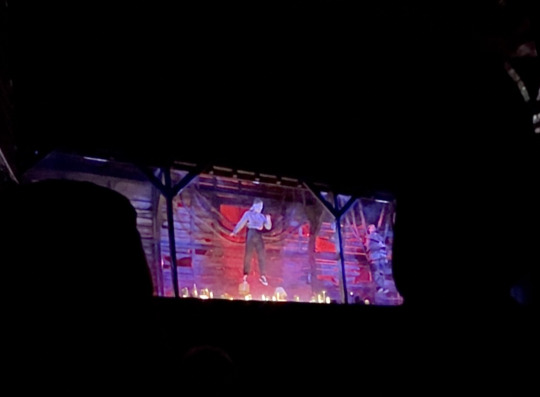

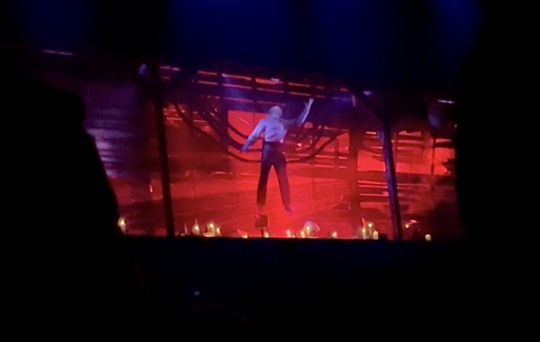

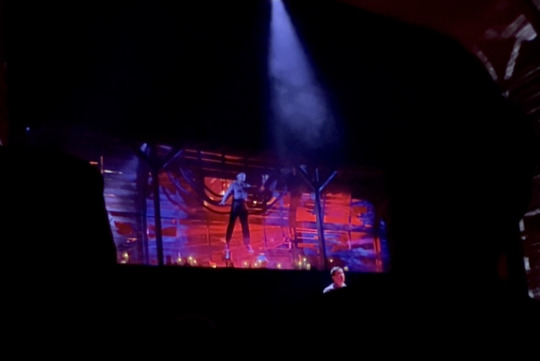
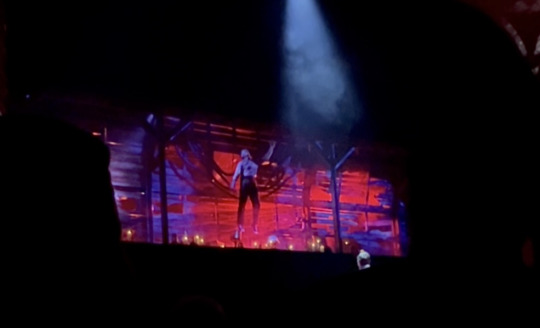
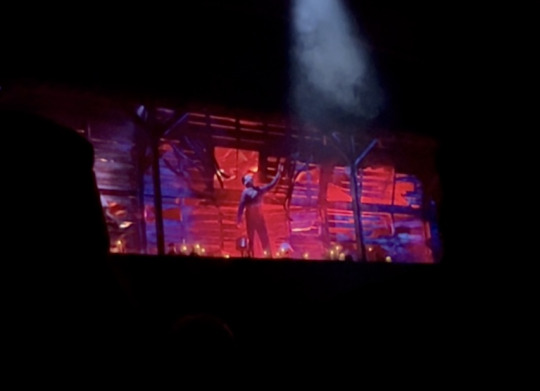

As in...I straight up don't think those tentacles or this sequence ever existed IRL.
I'm getting the feeling that Henry IRL attacked Mr. Newby the same way he later attacks Brenner and Inmate 58361:

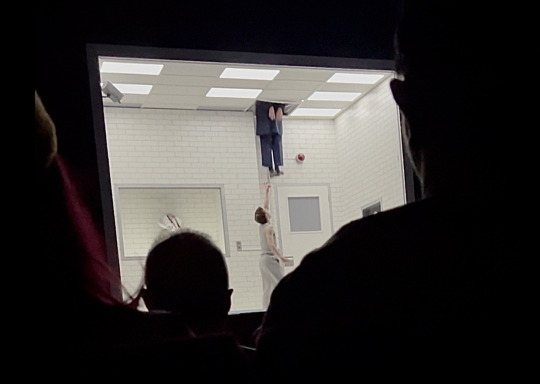
Eye-crushing, no breaking bones for 58361 (very similar to El's kill style), and then shot straight through the ceiling for Brenner. Same as Mr. Newby, but in two parts.
I'm actually fairly certain Henry's having a vision in the attic sequence.
We see this same red lighting appear just minutes before, when Patty's mother turns into a Vecna-fied version of herself to attack Henry...the same Vecna-type makeup Patty gets in Henry's vision of her back during the first DOTM rehearsal:


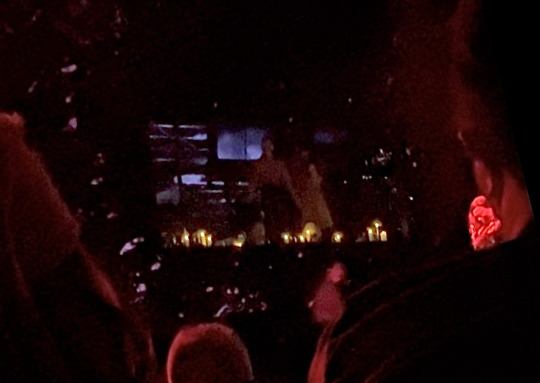

You can't see it from this angle, but Patty's mom has even got the clawed left hand and everything while she's forcing void-Henry to move in sync with her.
The next time we see Henry IRL, the lighting is back to normal and he's levitating on his own:



They close the curtains:

And when they come back up, he's bathed in red and strung up on the tentacles with Dimension X lightning in the background:

When the sequence ends, Henry in the void/on the stage floor drops to the ground in a heap, and "Henry" on the tentacles falls into a crouch:

But when we see IRL Henry next, the lighting is normal and he's picking himself up off the floor, just like void Henry:

Hell, Henry even tries to hide in the light of a "perfect" memory (Patty and him getting kicked out of Melvald's) when red-light Patty tells him, and I quote, "It's not real, it's a nightmare," (words Henry says to himself constantly) before going on to tell him it doesn't have to be a nightmare, he can make it a good dream.
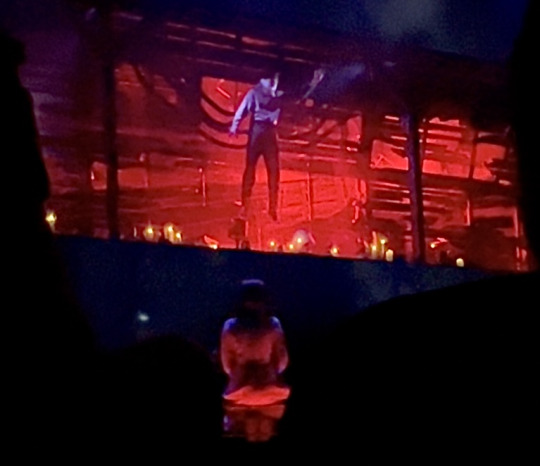
And when he starts to lose his grip on that memory, Patty in the red light tells him "It's your dream, remember? Anything is possible". Smash cut to the weird "I love you" and Henry freeing himself from the monster (for the moment).
This all becomes especially shrimpresting when you consider that it was red-lighting Patty who told Henry she loves him, and who snapped at him that he had to say it back to fight off the monster.
However, when Henry IRL tries to catch normal-lighting Patty to tell her where to find her mother, she screams "let go of me!" at him while she runs away and leaves him to pick himself up off the attic floor:



Patty remains terrified of Henry right up until Mr. Newby begs her to save him.
That doesn't sound like someone who just confessed their love to Henry as a way to try and walk him back out of the darkness. It just doesn't.
It sounds like, maybe, Henry pulling on a different memory of Patty to try and save himself, or something along those lines.
(Staring at Stav's post about the void being the alternate timeline, since he would be both in the void and in a vision...Henward are you trying to save each other..? Anyway, that's shrimping for a different post.)
Namely, the memory I'm thinking of is the confession booth scene. Henry tells Patty that he's pretty sure he can make his nightmares come true, and she advises him it's his dream, so why not make it a good one next time?
Arguably, you could say that Patty's trying that same shtick again under wildly different circumstances/she put it all together and knows what he needs to do to break free.
But then...if she, while being actively attacked, is so willing to stand by Henry/help him to the point where she's confessing her love for him, then why does she run and leave him to put himself back together even though he's obviously in distress? Why is she so terrified of him, to the point where she doesn't dare tell Bob about what really happened in the attic for fear of Henry coming after her?
It doesn't add up.
So, tl;dr: I don't think Patty ever said "I love you" to Henry at all. I think that whole damn sequence was a nightmare vision.
I think the "I love you" was something else, whether it be Henry subconsciously "making it a good dream" to save himself, irl Patty, and Mr. Newby...or someone else who a) knows what to do/how to help Henry, and b) is, as Patty says, "Connected, whether [Henry] likes it or not".
As a side note for support: Even Joyce and Hopper display more care for Henry post-attic than Patty does. Now, Patty is well within her rights to be terrified of Henry and not want anything to do with him, don't get me wrong...But don't try to tell me Henry and Patty are "true love/love at first sight" when Joyce and Hopper are ready to go take down Victor in part because Henry's gone missing.
The Jopper conversation when Joyce is convincing Hopper to help her take down Victor goes, and I quote:
Joyce: What about Henry, hm? Any explanation about what happened to him? Why no one knows where he is, or why it's like he disappeared?
Hopper: No one knows anything...or if they do, they're not talking.
Meanwhile, Patty is refusing to talk about what happened in the attic because she's terrified that Henry's listening, and that he'll come after her if she talks.
That's not convincing for "true love/love at first sight".
#i'm actually in shambles about Henry and Joyce's barely-there friendship#Joyce was really good to him when he was outcast/being a weird kid#It's like...no wonder she shows Will so much love. Just look at how she treats the brand new weirdo.#st: tfs#tfs spoilers
38 notes
·
View notes
Text
Our beloved local outdoor summer musical theater venue is doing Les Mis this summer and they're looking for 20 extra singers from the symphony chorus to fill out the ensemble on "Do You Hear the People Sing," "One Day More," and the finale -- it would basically involve a couple of days of intensive rehearsals (necessitating two days of vacation time) and a week of performances, it's after the symphony season is over, and it would allow me to do something I've dreamed of since I was ten.
So why am I waffling about it? Oh right, it's my mother's voice in my head. (It's probably also that recovering from covid has got me worried that my voice won't come back--even just with the symphony there's so much amazing stuff happening this season)
eta: it's actually 10 days that we need to be available for rehearsals, I think, which would make it a lot less doable for me, but idk if the supers need to be there the whole time -- I guess I'll go to the interest meeting in a couple of weeks and find out. We get 180 hours of vacation time a year but I will actually need to take a real vacation at some point
#back in the day they auditioned local kids for the child roles in the touring productions#i expressed an interest in this and she was like#'i don't think you'd be very believable as a waif'#also she's been calling me three times a day since i got sick and it's stressing me out#and like#i am my own person and she can't prevent me doing stuff obvs#it's just that she's sort of come to embody all my psychological hangups#i mentioned a while back that i had an opportunity to sing in the st. john passion#and she was like YOUR JOB COMES FIRST#it took me a long time to get over the feeling that i was going to get fired at any time#and she always comes right along to undermine it#it doesn't matter that i'm good at my job or that i work hard!#i'm fat and ugly!#and i have a personality!
26 notes
·
View notes
Text
F this, F that, F everything

#are.... ARE YOU FUCKING KIDDING ME?#THATS HOW YOU KILL EDDIE?#JUST LEAVE HIS CORPSE LIKE THAT AND NO ONE BUT HIS UNCLE AND DUSTIN MOURN FOR HIM?#This season has done more damage to the fans than the UD has done to Hawkins this season#ALSO JOPPER!!!! FINALLY. HAPPENED.#JANCY IS BACK TOGETHER!!!!!!#MILEVEN IS OK!!!#LUMAX PLEASE BE OK MAX PLEASE BE OK#FUCK VECNA ALL MY HOMIES HATE VECNA#stranger things#stranger things 4#stranger things spoilers#st spoilers#st4 vol2#st4 spoilers#eddie munson x reader#eddie munson x you#eddie munson x y/n#eddie munson#What a season good GOD
575 notes
·
View notes
Text
I’m always re-reading parts of A Little Life (I’m silly like that) and with each re-read I always end up noticing little details that I missed before because they’re usually just mentioned very passingly and therefore are easy to miss.
New recent discovery from my latest re-read is that Jude was actually beaten with a BROOM HANDLE when he endured that one beating at the group home in Montana, and that he was so viciously beaten with it that it left splinters embedded into his back that had blisters form around them.

#hanya are you against peace love and happiness#like#a BROOM HANDLE??????#HE WAS JUST A LITTLE KID OH MY GOODNESS#HE WAS THIRTEEN#AUUUUGGHHHHHHHHHHHHH#a little life#jude st francis#a little life play#een klein leven#a little life book
23 notes
·
View notes
Text
guy who always makes sure he's posed like an action figure whenever he's stationary for more than 3 seconds
#this is about commander riker. the man is a poser. he must ~pose~ everywhere.#all over the ship. all over the alien planets. gotta look ~cool~ everywhere he goes.#this is ok tho bc he's a good big brother figure to Wesley and a cool eldest space kid to Picard. so a little posing is excusable I think.#gurt says stuff#st: the next gen
103 notes
·
View notes
Text
People might not agree with me here, so Im curious:
(Do note that I am asking about his official job, and saying teacher or something does not exclude the possibility of other stuff on the side such as things dealing with monsters.)
#Idk I think he could be a really good teacher who wants to be what mr clarke was to him#someone who helps kids who are struggling#with school or family or trauma#I don't think he'll learn about therapy early enough#plus he loves science#also he 100% helps with Nancy’s supernatural investigations on the side#but maybe someone who's more invested in him knows something better#mike wheeler#stranger things#byler#<-target audience#plus gay teacher helping all the lgbt youth? (mr hauser coded)#st
21 notes
·
View notes
Text
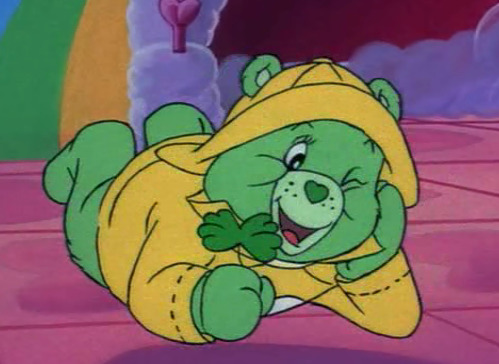
#good luck bear#care bears#cartoon#four leaf clover#st patricks day#kidcore#nostalgia#nostalgic#retro#childhood#kids tv#1980s#80s#eighties#80s kid
823 notes
·
View notes
Text
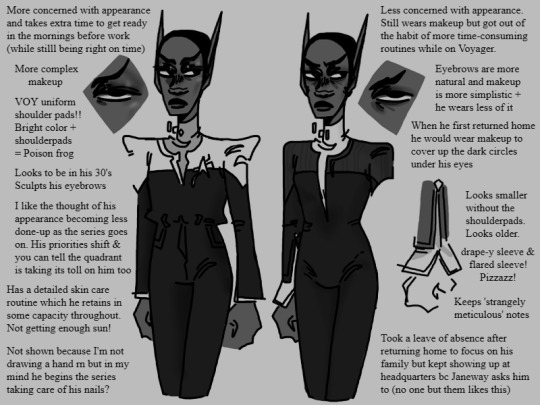

Tuvok Doodles + Thoughts
#doodle page#Tuvok#st voy#star trek voyager#st voyager#bea art tag#I like him <3#I think Tuvok & Janeway were very good friends before Voyager but Voyager turned them into co-dependent cats who'd die for one another#Tuvok: I'm going to take a step back from Starfleet to recover from this 7 year long nightmare experience.#Janeway: Do you want to go on a dangerous mission with me?#Tuvok: Oh thank god. Yes.#<- His kids keep trying to get him to go to therapy. He already went out into the desert!!! He doesn't need to!!!
26 notes
·
View notes
Text
My 3 little cousins were baptized today. "Triggered" is kind of a strong word but being in a catholic church again... I'm a little fragile rn ngl.
#butch speaks#it was hard not to shake as i held J over the basin to have the water poured on his head#when he was cleansed of sin. as if a little kid could ever knowly or intentionally offend a so-called loving god#the words came naturally to me#but they meant nothing#i remember when they used to mean something. when i begged gods forgiveness for my sin (being a lesbian) and tried to pray the gay away#i remember how much i wanted to die bc i could never truly embrace the sacred#i STILL deal with the complex of catholic guilt. its a very real thing. its hard to shake#i cant help but wonder if the catholicism ingrained in my brain is why i have a hard time with casual dating n sex#fun fact: there was a point when i was a teen that i got REALLY catholic#i prayed everyday. i talked to my patrin saint (st agnes) every day. i wantsd to become a nun#the thought of marrying a man mad me more sad than feeling like an alien did. so id marry the church as a nun.#not the way to hide being a dyke when ur fam is catholic btw LMAO#the first priest i knew was father joe. i loved that guy. he was so kind. friendly. briming with love.#he was one of my biggest references for what a good person was like#he talked about gods love a lot. how its for everyone. no one is exluded. ever.#he used to look right at me when he said stuff like that. a few other kids too. all of whom grew up to be queer#then father joe passed away. our church merged with another church. father jeff was the priest there.#he was kind but not as kind. he talked about hell and sin more. he looked at the same kids father joe did.#but the kindness in his eyes wasnt there.#that wasnt for us.#my family wasnt even THAT catholic#i went to church every sunday i did vacation bible school and catechism classes and youth group#i was an altar servant and in the choir#i even used to speak/understand a little latin#imagine how much worse id have been if my mom could have afforded catholic school lmao#grateful to have grown up poor in that regard#hm. actually... reading my own tags. mayne we were pretty catholic actually.#fucking hell.#i need to have lesbian sex in a church before god and everyone. mayeb that would fix me.
15 notes
·
View notes
Text
We Really Need To Talk About Henry Creel and the "Psychopath" Label.
I'm putting the word "psychopath" on a high shelf and out of reach until further notice because we as a whole clearly a) does not understand what psychopathy is, b) does not know what it actually looks like in people, and c) is more than happy feeding into the already existing stigma around the disorder by using the term to describe someone who is a villain, but who's also very much not a psychopath if you look at his actual mannerisms and beliefs.
That is to say: If we completely ignore any timeline fuckery and treat Vecna/Henry like one singular guy...The terms you all are looking for are "pathological altruism", "superiority complex", cPTSD, and/or autism.
Y'know, things that can stem from intense, prolonged childhood trauma and are characterized by a) believing oneself to have the power, authority, and duty to fix others' problems for them, b) fluctuations in sensitivity/reactivity to triggering situations, and c) reactive judgmental behavior.
"Psychopath" is not a catch-all for villains, and it does not equate to "violent man disorder".
Let's do a little psychoanalysis of what Henry actually does, working chronologically.
Little Henry (age 12)
He's described as "sensitive".
This is code for many things throughout the show, some of which being artistic tendencies, quiet personality, increased vulnerability to emotional harm, queerness, neurodivergence, and connection to the supernatural.
He's shown gently collecting spiders in furnished jars.
Henry identifies with the spiders, identifies that they both have been cast aside, and uses that connection to reach the conclusion that the spiders need love and care. He then handles them gently and spends time making homes for them.
This alone is a display of empathy, sympathy, and compassion.
He's lonely, rejected by his mother and his peers.
This rejection hurts him, and he later bitterly internalizes/recontextualizes the experience to avoid that hurt.
He's called "broken", but later realizes that he isn't broken at all.
This indicates that he believed he was broken for some span of time, and his later anger surrounding the topic indicates that that experience hurt him.
He displays a variety of emotions.
Henry openly displays sadness, fear, anger, enjoyment, fascination, and excitement.
He is unable to hide his social "wrongness".
He couldn't hide the fact that he was different from the other children, indicating that a) he tried and failed, and b) he wanted to fit in at one point.
His father seemed to have liked him as a person.
Whatever was "wrong" with Henry, whatever it was that he couldn't hide, it wasn't something that made Victor dislike him.
He recognizes cruelty in society and openly condemns it.
Yes, I recognize the later irony in that. That's part of the narrative structure of his villain arc. This isn't about Vecna, it's about preteen Henry.
He hates dishonesty.
Whether it be dishonesty with others or with the self, Henry has a specific and powerful hatred of lying.
Now, if anyone tries to tell you about diagnosed "child psychopaths", they're lying to you.
Psychopathy is clinically knowns as Anti-Social Personality Disorder, and it cannot be diagnosed until ages 18+, since children tend to grow out of any "psychopathy markers" they might display in childhood. Children displaying these markers might be flagged as having "conduct disorder", but not psychopathy.
However, lets look at the markers anyway:
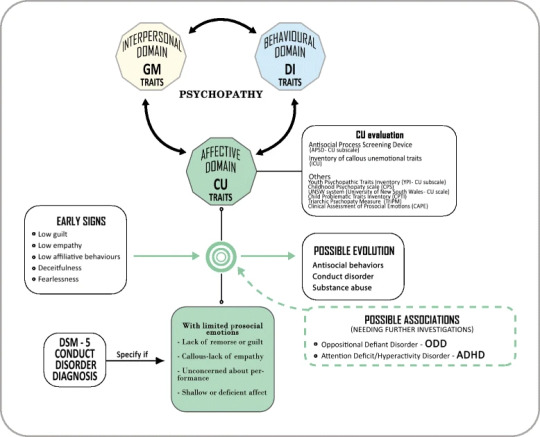
GM: Grandiose-Manipulative, DI: Daring-Impulsive, CU: Callous-Unemotional
Source
Conduct disorder: Generally characterized by aggression towards others/destruction of property, lying, theft, and limited prosocial emotions.
GM: Superficial charm, glibness, suave behavior. Megalomania and narcissism. Lying.
DI: Fearlessness, impulsivity, recklessness, lack of responsibility. Risk taking behaviors.
CU: Lack of remorse, empathy, sympathy, or compassion. Shallow emotional affect.
Let's tally him up.
Psychopathy:
Grandiose-Manipulative: ❌
Henry does not fit in, and it's clear to everyone that he does not fit in. He can't hide this, no matter how hard he tries. He is not charming or suave. He also internalizes the "broken" label and recognizes that he's rejected for a reason, and it hurts him. It's only later in his childhood that he realizes being different=/=being broken. He has a specific hatred of lying.
If we compare him to Billy, the narrative anti-hero who acts as both parallel and foil to him, we can see artificial charm in action. Billy lies and uses acting to get his way. Repeatedly (see: his interactions with Karen).
Billy represents GM behaviors in action.
Little Henry is, then, in direct conflict with GM traits.
Daring-Impulsive: ❌
Henry only lashes out with violence when he perceives himself as being in imminent danger. He is shown as and later described as being afraid. The only fearlessness we see is in regard to spiders, and that fearlessness can be traced back to his empathy for the spiders as disliked/socially rejected creatures.
Again, Billy. Billy and his erratic driving with Max in ST2 and his attempted fling with Karen are both classic displays of DI traits.
Little Henry, in contrast, does not display DI traits.
Callous-Unemotional: ❌
Henry displays a range of genuine emotions. He also displays empathy, sympathy, and compassion. He's described as a sensitive child, for heaven's sake.
Billy, as a contrast, does not display empathy, sympathy, or compassion. He's unnecessarily cruel and violent for his own entertainment (the car scene) or to maintain control (Max), and he does not display remorse for it.
Little Henry does not meet the criteria for CU traits.
Conduct Disorder:
Aggression/Destruction: ❌
Henry is often hiding, he's reclusive, his father describes him as "sensitive", and he's gentle with the spiders. Even his later visions aren't particularly aggressive. It's spiders crawling out of a drain, a cradle in a fireplace. Disturbing, yes, but not aggressive.
Henry is shown killing a rabbit, but his reaction is distinctly unhappy and we're only conclusively shown him doing so once. Due to differences in killing style between his singular kill and the other dead animals his family finds on the property and the fact that there are animals that show up mutilated on the Creel property which Henry wouldn't reasonably have access to (see: chickens)...It's not a concrete pattern of behavior.
He's not an aggressive child, especially if compared to Billy. Billy is openly violent and aggressive, and he seeks out opportunities to physically hurt others. Henry does not do this. He only lashes out when cornered, which is what happened in 1959 (if we take canon at face value).
Theft: ❌
We are not shown any instances of or inclination towards theft.
Low guilt/remorse: Inconclusive
Henry is shown (supposedly) practicing his powers on a rabbit, but he looks distinctly disturbed while doing so. Henry lashes out at his mother with his powers and displays little remorse, but that was self-defense, which muddies the remorse waters.
Compare him to Billy, who is clearly enjoying tormenting kids whenever he can (see: the fatshaming at the pool, Max in the car, Lucas at the Byers house).
Generally, Henry doesn't meet this criterion, but it remains inconclusive.
Low Empathy: ❌
Henry visibly and verbally displays empathy for the spiders (A similar trait in autism: more empathy for creatures than humans)
Low Affiliative Behaviors: Inconclusive
He has issues with regulating eye-contact (it seems like he tends to stare), and he doesn't seem to seek people out. He's reclusive and quiet. However, these are also shared traits with autism...or just being an introvert, and we do see him display warmth/happiness on multiple occasions. We also know he has interest in connection with others due to his later bitterness over the lack of connection he experienced as a child.
Deceitfulness: ❌
Henry hates lying and dishonesty. That's his whole thing.
Fearlessness: ❌
Henry visibly and verbally displays fear on many occasions.
Henry Creel, age 12, is not meeting the markers for conduct disorder/precursors for psychopathy.
Next time point.
Henry Creel, age 32: Orderly
He's good with kids.
He soothes El's anxiety, calmly engages with her anger surrounding her mother, sits on the floor beside her to be on her level, takes her concerns seriously, and tries to help her succeed against her struggles in the lab.
He's relatively social.
He's the only orderly who interacts with the children willingly/actively seeks out social connection with the children. He's shown wandering around the room observing them, and he seeks El out as company (this will come back later).
He's not harsh with the children.
In ST1, we see El being carries around by her arms and thrown around by orderlies. We see Henry being dragged by his arms by orderlies after his electrocution scene. Henry, even when given the authority of an orderly, doesn't engage in this kind of disregard for a) personal space, b) autonomy, and c) wellbeing. The worst we see from him is his reprimand of 002 when 002 is bullying El, and even that's just a quick verbal reprimand.
He empathizes and sympathizes with the children.
Henry is openly disturbed by 002's electrocution, even when no one is watching him except the audience. El isn't watching, Brenner isn't watching. Henry empathizes with 002, given that his own electrocution scene just happened in the previous episode. We're being shown genuine empathy and sympathy coming from Henry.
He's still quiet, gentle, and reclusive.
He often hunches in on himself when he's not being watched by Brenner. He's consistently soft-spoken and unassuming. His likability comes from his lack of stereotypical superficial charm/suaveness. He comes off as the guy who was bullied to hell and back as a kid, not like a politician (which is what psychopathic charm is most likened to).
When he isn't being like that, it's an act...and an unconvincing one at that.
Henry looks distinctly uncomfortable and out of place when he's trying to play the straight-backed, unfeeling orderly. We get tons of side-eye from him directed at Brenner. He doesn't enjoy being on display like that.
Henry tries to help El and then acknowledges that it didn't work/made things worse.
Henry tries to help El escape with no request for anything in return.
Her escape was not transactional. Soteria's removal only happened when El reached out about Henry not coming with her, and even then he never asks her to remove it. He gives her information, and then he lets her make her own choices. She wants him to come with, he did not ask her to set him free. All this, despite the fact that he easily could have asked her to remove it as repayment for letting her loose without any red flags being raised on El's part.
Henry displays concern for El's wellbeing
He takes her with him when the guards come running after Soteria, even though it would have been a good distraction/would have given him a head start if he'd left her. He defends her and himself from the guards who clearly want to hurt them. He hides her in the store room and tells her he's going to find them a way out.
Let's tally him up.
Grandiose-Manipulative: ❌
Henry still lacks the "classic" psychopathic charm. He's still a bit kooky, definitely not suave. A touch of narcissism might come into play with his desire to "save" El, but that's leaning into pathological altruism. He doesn't display himself as powerful, even after Soteria is removed. He's still soft-spoken and curled in on himself.
Of course, we could argue that he's doing all this to manipulate El. Sure...but he never asks for anything in return even when it would be logical and understandable to do so.
Getting El to remove Soteria would be like taking candy from a baby. All he'd have to do is say "If you take Soteria out, then I can help you escape. I can only help you if you take it out, though", and she'd do it. She's a lab-raised 8 year old.
It would be a far safer gamble for him to flex his authority than to...what? Not mention it and hope she says something? Hope she chooses to do something? Okay.
Hell, if we take the show at face value, no timelines or anything...Henry has already leveraged his authority with El before. "If you want to escape, you must do exactly as I say", he tells her in the chess scene...and then he just straight up never mentions Soteria.
No matter how you slice it...that wasn't manipulation. It was altruism.
Daring-Impulsive: ❌
Henry does display risk-taking behaviors, but we need to apply context. He's been locked and abused in this lab for 20 years, El's been there for 8 years under similar conditions...there's no chance at escape for either of them unless someone takes a risk. Even so, it's not the type of risk that's associated with thrill-seeking. He's not doing it for the thrill, he's doing it to get out.
Callous-Unfeeling: ❌
It's a bit more difficult to say that it's not an act here because he's usually being watched by El, however...in the times when he's not being watched, he displays empathy, sympathy, and compassion, and those displays are paired with distinction emotional expressions.
This is where the escape scene comes into play.
Henry once again only attacks once he's cornered and in danger (not to mention that this time he has a dependent to worry about). His plan is to run. He's not inclined towards violence until he's left with no other choice, and when he does lash out he doesn't actually use his powers to kill until that final guard (who seemed to take great pleasure in the prospect of getting to shocked both him and El). He throws the other soldiers around, but he doesn't give them that menacing, sadistic look. That's reserved for that specific guard. It's sadism borne of a personal grudge due to prolonged mistreatment. It's revenge, not sadism for the sake of sadism.
Orderly Henry Creel, age 32, definitely has something going on up there (likely a whopping dose of cPTSD). He sure is a Guy in a Situation. However, he does not meet the criteria for psychopathy.
And now, my favorite and most controversial section:
Vecna-Henry (ages 32-38)
First and foremost: I need you all to read this with the understanding that I am explaining behaviors, not excusing them. Nothing that happened was right or justified, based on a normal person's frame of mind. However, in order to even come close to psychoanalyzing someone, you have to get inside their head. It's their thoughts and motivations that matter here, not what outsiders judge them to be. That's why it takes months of talking and testing to pin down diagnoses.
We need to be able to look at things from Henry's point of view and piece it together in his frame of mind. You feel me? Good.
I'm abandoning the checklist format for this section because it requires more nuance than just "yes" or "no", but I'm still going to list off some key traits about Vecna:
He chooses his victims carefully.
Our 4 victims are not chosen willy-nilly. This isn't "I want to kill for fun", or we'd have Art the Clown instead. He personally kills exactly as many as he needs to open the Rifts, no more.
He doesn't kill for killing's sake.
Each victim is chosen with a specific backstory in mind.
I've spoken about this before, but if you know anything about serial killers it's that they're almost always going after victims that tie into their own trauma (i.e. killers with mommy issues going after women who look like their mothers, etc).
Stranger Things, of course, is a touch more intricate.
The order and specific stories of the victims tells a meta narrative. Chrissy and her horrible mother with the rotting food that's a direct link to the custom-made painting in the Creel dining room during the dinner scene. Fred and being a murderer, even though it was a negligent accident. Max and Billy, whose story is so complex and so inverse of Henry's that it fits perfectly with a song about swapping places to feel how the other feels. Again, a death outside of the victim's control, but this time tinged with the relief that an abuser had died after years of wishing for it to happen. Patrick and his abusive father, his abusive Papa, if you will.
They tell us a story, just like almost every other serial killer.
We know Virginia was a bad mother based on the situation Henry finds himself in at age 12, but we're never shown the extent of that conflict because we never see them interact. It wasn't physically possible for Henry to have killed Alice. How could Henry, who was near-fainting after having "killed" Virginia, find the strength to trance Victor and kill Alice? How could he do that, when we don't even see Vecna do that, when he's so much more powerful? He's not capable of multitasking. ST4 made that very clear. Thus, negligent death. Billy and Max vs the Creel murders are essentially just an inverse situation. Older abuser dies, the young victim wished for it to happen and is now Feeling Things about the situation. Lost a sibling in the process. And last but not least, Patrick, who shares a name with a lab guard in ST1 and has an abusive father. That's a Brenner link.
It's a story by proxy.
Vecna uses that shared trauma to connect with his victims. (That's the real deal: Shared Trauma). It's weaponized empathy.
He talks over and over again about honesty and ending suffering.
Those are his two huge Things in his kills. He holds up a mirror to what the victim perceives to be the worst part of them, and then he turns around and all but tells them he'll make it end. After all...everyone is just waiting, waiting for it all to be over.
He's got a fixation on making sure his victim knows that a) this was their fault, and b) he's being the Good Guy by relieving their suffering.
He has no reason left to pretend to have a Good Moral Justification for his kills, and yet he still talks to his victims like he's justifying their deaths.
That's...a lot, but let's dive right in.
Henry and his funky morality complex is endlessly fascinating to me, because what he seems to be doing is self-soothing about it all. Psychopaths, in contrast, are aware of moral compasses, of good and bad, but they aren't typically beholden to the concept. A psychopath likely wouldn't feel the need to self-soothe about their actions by telling themselves and others that they're doing what they're doing to relieve suffering...which is coincidentally exactly what Henry, as Vecna, does the whole time.
At this stage in the story, Henry would have no reason to keep up that kind of savior charade when his audience is just himself and his victim. There's no one there to manipulate by falsifying morality. The only other person listening is going to die imminently.
The interesting part comes in when we understand that Henry doesn't have to play the angel at all in ST4. He's certain he's already succeeded by the time we realize what he's up to. He doesn't have anything to gain by lying about his perceived morality. Psychopaths, generally speaking, don't care enough to put the effort into lying if it isn't useful. That means that the last time he would have actually needed to play the angel was during his 1979 monologue. However, we see the same phrases about suffering and the associated release that we hear in 1979 continuing to return as far in as 1986, when Henry no longer has any reason to lie, even if he were okay with lying in the first place (which he's not)! They're all genuine lines. They're a core part of his character.
Vecna wants to be in the right, in the clear, morally. He can't accept that what he's doing is abusive; he has to frame it specifically so that he is doing what's right, that he's freeing people and solving problems.
He's doing his damndest to actualize his "predator, but for good" line from 1979.
This does not smack of psychopathy.
This smells like a savior complex.
Even as far back as 1979, Henry has been obsessed with saving things from their problems ("Tricked you? No. I saved you"). He "saves" spiders from the vents of his house and gives them new homes, he "saves" El from the lab's brainwashing, he "saves" the ST4 victims from their suffering...and dare I say it...he "saves" the lab children in 1979 from their suffering as part of Brenner's lab, the only true escape from which is death (And if it was a 2-birds-1-stone situation with absorbing abilities...well. That's just a bonus).
Granted, the morality surrounding the manifestation of Henry's savior complex has been warped by massive psychic alteration and 20 years of unimaginable abuse with no feasible escape, so yeah. It's a little fucked up. He's a little fucked up. Obviously.
However, at it's core: Everything Henry has ever done has (in his mind) been Right, Good, and Necessary, despite the fact that he's now actively doing more harm than good.
This reeks of pathological altruism.
Here's what that can look like, clinically:

Source


Source

Source
Well damn, doesn't that sound familiar? (I'm staring directly at Henry's spider hoarding versus the above image)
"Saving" spiders, but condemning them to death in jars after his kidnapping.
"Saving" El from the lab, but traumatizing her and ultimately condemning her to his own fate: being the sole focus of Brenner's attention.
"Saving" the ST4 victims from their suffering, but hurting them in an attempt to kill two birds with one stone: free himself, and eliminate their suffering as a nice morality bonus.
Pathological Altruism. Savior Complex.
Jamie himself has said that, based on what has been shown to us, Henry truly believes that what he's doing is right and beneficial (which fits with his Catholic-God coding (here) so well).
All this to say, and I cannot stress this enough: This is not psychopathy. What Henry displays is not psychopathy. This is pathological altruism. Psychopaths, particularly those who go on to commit violent crimes, largely do not have savior complexes. A psychopathic serial killer would not care, and would not hide that they don't care if there isn't anything to gain from it.
Henry also has this incredible fixation on truth and right vs wrong, and yes, he weaponizes that, but again he does so while self-soothing with padded morality phrasing. He monologues for ages about how terrible it is that everyone is lying to themselves and others, and how everyone is suffering but no one wants to admit it. His main goal is remaking the world with a "better" version of society that's less oppressive (which happens to be one where a rule-bound society is entirely done away with).
Henry then swings way past "Good, Right, Necessary" into villain territory but going so far as to force his victims into facing the truth of what's going on inside their heads, forcing them to stop lying about their own mental states, only to then use the "worst" thing about themselves to judge them. He's quite literally playing God based on his use of right and wrong to maintain control/power while holding a moral high ground. (He's doing a pretty good job, too. He sounds just like the Catholic God.)
This is not psychopathic behavior.
His behavior seems more like black/white judgmental thinking:

A misguided and overwhelmingly strong sense of justice:
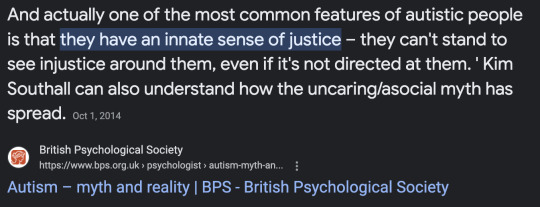
Source
and a killer superiority complex fueled by chronically low self-esteem:

Source
A psychopathic serial killer would have little attachment to truth or right and wrong.
A psychopathic serial killer would not care.

Source
The thing is: Henry's whole issue is that he cares entirely too much. His problem is that everything matters, everything can and should be sorted into good and evil, right and wrong (and obviously he is in the right here), save and destroy. It's judgement and warped justice and the need to believe he's special, that it all happened for a reason, that the world deserves to burn for what it did to people like him, that he can fix the world if he destroys it first.
This also happens to be why Henry cannot be considered a nihilist, which is another term I'm putting up on a shelf. Henry sees the world as inherently having value, that life has value, that there's something worth rebuilding (so long as he gets to dictate what the rules are...so long as he never gets hurt again). If he didn't care so much, he wouldn't be so damn upset about it all. He's a mess. He legitimately cares too much, the hurt is too deep.
That, in combination with the perspective warping from not only his absorptive quality but also 20 years of MKULTRA/Hawkins National Lab Fuckery, has created the mentality we see in ST4 and the actions it has manifested in (again, ignoring timelines).
Vecna is a violent, lab-made hypocrite with a touch of trauma-borne misanthropy, for sure, but he's not a psychopath.
tl; dr: Psychopathy is not synonymous with "villainous man disorder". Henry Creel is not a psychopath, though as it stands he is technically our villain.
#breaking: media fans told that psychopathy is NOT just ''evil man'' disorder#[squirts fans with a water bottle] AHT. AHT. PUT THE LABEL DOWN.#henry was a good kid. a good young man even. and i'm standing by it#henry creel analysis#henry/vecna/001#psychoanalyzing henry creel#st character analysis#stranger things
140 notes
·
View notes